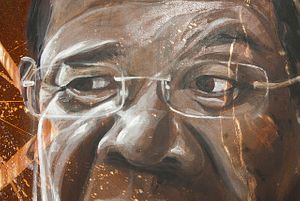Australian miner Bill Clough has ended months of speculation and announced the sale of The Phnom Penh Post – effectively the last bastion of independent journalism in Cambodia – to a Malaysian investor for an undisclosed sum.
The sale raised fresh fears over independent journalism in Cambodia, where radio stations and The Cambodian Daily have closed while the opposition Cambodian National Rescue Party (CNRP) has been dissolved and its leaders jailed or fled into exile as Prime Minister Hun Sen looks to consolidate his authority ahead of upcoming elections this year.
Clough hinted the current media climate had influenced his decision to sell Post Media Ltd, which includes The Phnom Penh Post and Post Khmer publications, to Sivakumar G, known as Siva.
“The region is full of turbulence and the recent changes within Cambodia ahead of, leading up to, the upcoming elections, has put the spotlight on The Phnom Penh Post, as the last remaining truly independent media group in the country,” he said.
“There have been rumors flying in all directions with questions about our ongoing survival, which we hope that now we can finally dispel.”
The Phnom Penh Post was established by Michael Hayes and Kathleen O’Keefe in 1992, when United Nations peacekeepers arrived in Cambodia, with their life savings of $50,000.
It enjoyed a reputation for telling the truth while maintaining a sympathetic ear for this country’s plight and its tragic history. The newspaper also became a proving ground for young journalists out to make their mark.
Hayes sold the newspaper in 2008 and it maintained its reputation for solid reporting, despite the current difficult conditions.
But the newspaper had also fallen on tough financial times, and like the Cambodia Daily, had been hit with a multi-million-dollar tax bill. Human rights groups and free press advocates say the government is using the tax department to help silence dissent ahead of general elections due on July 29.
Hun Sen, the region’s longest serving leader, insists the crackdown was necessary, claiming Cambodia had been threatened by outside forces plotting a color revolution. He insists he is healthy and will rule for at least another decade.
Little is known about the new owner Siva, although he has been linked to Mohan Tirvgmanasam Banddam, who calls himself T. Mohan, owner of The Khmer Times, a newspaper which has built a reputation on being government-friendly.
The “rumors” mentioned by Clough included Mohan as a potential buyer through a Malaysian partner, and a possible merger of The Phnom Penh Post with The Khmer Times.
Nathan Thompson, president of the Overseas Press Club of Cambodia, said The Phnom Penh Post has been a stalwart voice of independent journalism in a country that plunged 10 spots in the latest press freedom index by Reporters Sans Frontier (RSF), to 142nd place.
“I hope its tradition of telling truth to power continues,” he said.
The courts have also taken a toll on independent journalism, with reporters complaining that self-censorship has never been heavier.
Australian filmmaker and journalist James Ricketson, 69, has been charged with spying, and his case has also been tied to the dissolution of the CNRP. He was admitted to a prison hospital last week suffering from a chest infection and dizzy spells.
Two former Radio Free Asia journalists, Yeang Sothearin, 35, and Oun Chhin, 49, have also been charged with espionage. Those two remain in prison.
According to RSF: “After the opposition did surprisingly well in the June 2017 municipal elections, the regime launched an all-out war on independent media outlets with the aim of ensuring victory in the general elections scheduled for July 2018.”
Whether The Phnom Penh Post is the latest casualty in that “all-out war” remains to be seen. Already, just after the sale, reports have begun surfacing about firings and resignations, which further reinforce concerns about the state of press freedom in Cambodia.
Luke Hunt can be followed on Twitter @lukeanthonyhunt
































